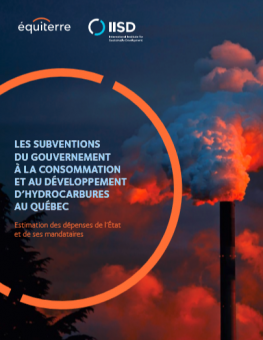
Les subventions du gouvernement à la consommation et au développement d'hydrocarbures au Québec
De 2011-12 à 2016-17, le gouvernement du Québec a ainsi versé en moyenne 300 millions de dollars par année en allègement à la taxe sur les carburants, des mesures qui vont à l’encontre d’une diminution de la consommation d’hydrocarbures.
Le gouvernement du Québec a annoncé la cible de réduction des émissions de GES la plus ambitieuse au Canada : une réduction de 37,5 % sous le seuil de 1990 d’ici 2030.
See English translation below.
Le Québec s’est également doté d’une politique énergétique à l’horizon 2030; elle met à l’avant-plan une transition énergétique et une économie sobres en carbone. La province veut réduire de 40 % la quantité de produits pétroliers consommés sur son territoire d’ici 2030 et augmenter de 25 % la production totale d’énergies renouvelables actuelle pour la même période.
Ces engagements ambitieux impliquent une sortie progressive des hydrocarbures, mais le Québec a-t-il entamé ce processus et emprunte-t-il la bonne voie pour atteindre les cibles qu’il s’est fixées?
C’est pour répondre à ce questionnement que ce rapport a vu le jour. Une bonne manière de savoir si le gouvernement du Québec se désengage effectivement des hydrocarbures était de voir l’évolution des subventions1 octroyées à ce secteur. Devant l’absence de données compilées permettant d’avoir un portrait global des sommes versées en soutien à ces industries et ces types d’énergies, nous avons décidé de réaliser ce travail de recherche et de compilation. Ces résultats, certes incomplets, mais les plus exhaustifs et à jour en la matière, sont présentés ici.
À la lumière de cette recherche approfondie, force est de constater que le gouvernement du Québec continue d’inciter à la consommation d’hydrocarbures dans plusieurs secteurs économiques par des exemptions ou allègements fiscaux et pose des gestes qui vont à l’encontre de ses engagements de réduction de GES à l’horizon 2030 et de 2050. De 2011-12 à 2016-17, le gouvernement du Québec a ainsi versé en moyenne 300 millions de dollars par année en allègement à la taxe sur les carburants, des mesures qui vont à l’encontre d’une diminution de la consommation d’hydrocarbures. À cela s’ajoutent des transferts budgétaires et investissements directs ponctuels qui appuient la consommation d’hydrocarbures au Québec.
The Québec Government has just announced the most ambitious GHG emissions reduction target in Canada – a reduction of 37.5% below 1990 levels by 2030. Québec has also adopted an Energy Policy with a 2030 time horizon; it envisages a low-carbon economy and a transition in the types of energy used.
The province would like to reduce the amount of petroleum-based products used by 40% between now and 2030 and increase the total amount of renewable energy being produced by 25% above the current figure during that same period.
These ambitious commitments imply a progressive reduction in the amount of hydrocarbons used, but has Québec actually begun this process and is it on track to achieving the targets that it has set for itself?
It is precisely in response to these questions that this report has been prepared. One good way to determine whether the Québec Government is effectively relying less and less on hydrocarbons is to look at how subsidies tied to hydrocarbons have evolved. Given the lack of compiled data that would provide an overall picture of the amounts paid out to support these industries and these types of energy, we decided to undertake this research and compilation project. So while these results are certainly incomplete, they are still the most exhaustive available on the subject to date and are being presented here.
Based on our in-depth research, it has become obvious that the Québec Government continues to incentivize the use of hydrocarbons in a number of economic areas by providing exemptions or tax relief and is taking steps that run counter to its GHG reduction commitments for the periods leading up to 2030 and 2050. Between 2011-12 and 2016-17, the Québec Government paid out on average a minimum of 300 million dollars per year in fuel-tax relief, actions that belie a reduction in the use of hydrocarbons. Added to this are budgetary transfers and one-time direct investments that directly support the use of hydrocarbons in Québec.
Summary courtesy of Equiterre
Funded by
You might also be interested in
December 2024 | Carbon Minefields Oil and Gas Exploration Monitor
In November 2024, 23 oil and gas exploration licences were awarded across five countries, with Russia granting the licences that account for the largest portion of embodied emissions.
Increased Support Needed to Achieve India's Clean Energy Goals
India is on track to achieve many of its 2030 clean energy goals but needs to step up government support measures to accelerate the deployment of offshore wind, electric vehicles, and green hydrogen, according to a new report.
Budgeting for Net Zero
This study estimates the cost gap for battery energy storage systems (BESSs), offshore wind, solar photovoltaic (PV), electric vehicles (EVs), and green hydrogen (GH2) to inform government support.
Artisanal and Small-Scale Mining of Critical Minerals
This report examines the potential for artisanal and small-scale mining (ASM) to take an expanded role in the global supply of critical minerals.